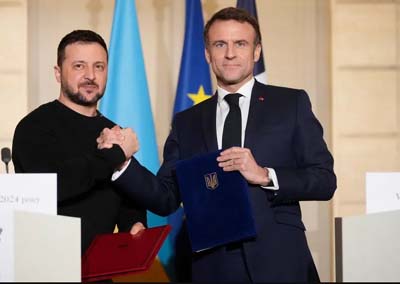
France talks tough on Ukraine while gobbling up more Russian gas
Victor Jack
Brussels: Put your money where your mouth is. Such grumbling is percolating across Europe as new data reveals France quietly ramping up gas payments to Russia just as President Emmanuel Macron loudly positions himself as one of Ukraine’s staunchest defenders.
In the first three months of this year, Russian liquefied natural gas deliveries to France grew more than to any other country in the EU compared to last year, according to data analyzed by the Centre for Research on Energy and Clean Air (CREA) think tank for POLITICO.
In all, Paris has paid over €600 million to the Kremlin for gas supplies since the start of the year, the data showed — leading to calls for France to clamp down on its rising purchases.
“It cannot be that France, on the one hand, says that we have to be harsh with Russia and on the other hand, is paying them off with big money,” said a diplomat from one EU country, who like others for this story, was granted anonymity to speak candidly.
Paris’ growing gas trade with Russia comes as Macron has sought to take a harder line in support of Kyiv two years after Moscow first launched its full-scale invasion of its neighbor.
Last month, the French leader refused to rule out sending troops to Ukraine and urged allies not to be “cowards” in defending Kyiv, marking a sharp turn from his previous calls not to “humiliate” Russian President Vladimir Putin.
France insists its gas buys are necessary to keep supplies flowing to households across Europe and that it’s locked into a long-term agreement with Russia that is legally complex to escape. But critics said Paris could do more to reduce the bloc’s purchases, arguing its inaction is partly down to resistance from France’s national energy major TotalEnergies.
In all cases, the imports expose the EU’s flagging efforts to stamp out Russia’s fossil fuel revenues — which account for almost half the Kremlin’s budget — as Moscow finds increasingly creative ways to circumvent existing measures and EU sanctions stutter.
“This isn’t an easy topic,” a French energy ministry official conceded. “If we continue to pay for gas we do not import, there is no point,” referring to long-term contracts that TotalEnergies has signed which force it to to buy LNG from Russia.
Within months of Russia’s full-scale assault on Ukraine in 2022, the EU presented a plan to end the bloc’s reliance on Moscow’s fossil imports by 2027.
So far, it’s largely been successful. Though some in the EU continue to buy nuclear fuel and some pipeline oil and gas from Russia, the bloc has slashed its dependence on Moscow’s gas by around two-thirds and imposed a blanket ban on coal and oil imports by sea.
But similar efforts to cut out liquid natural gas, or LNG, have floundered. Although the fuel accounted for just five percent of the EU’s gas consumption last year, EU countries paid Moscow more than €8 billion for its exports, according to a new report from CREA out Thursday.
France is far from the only culprit. At least nine EU countries continue to buy Russian LNG, the shipping data showed. But Paris led the bloc in both absolute volumes imported in 2024 — 1.5 million tons in total — and the increase in purchases compared to the same period last year.
